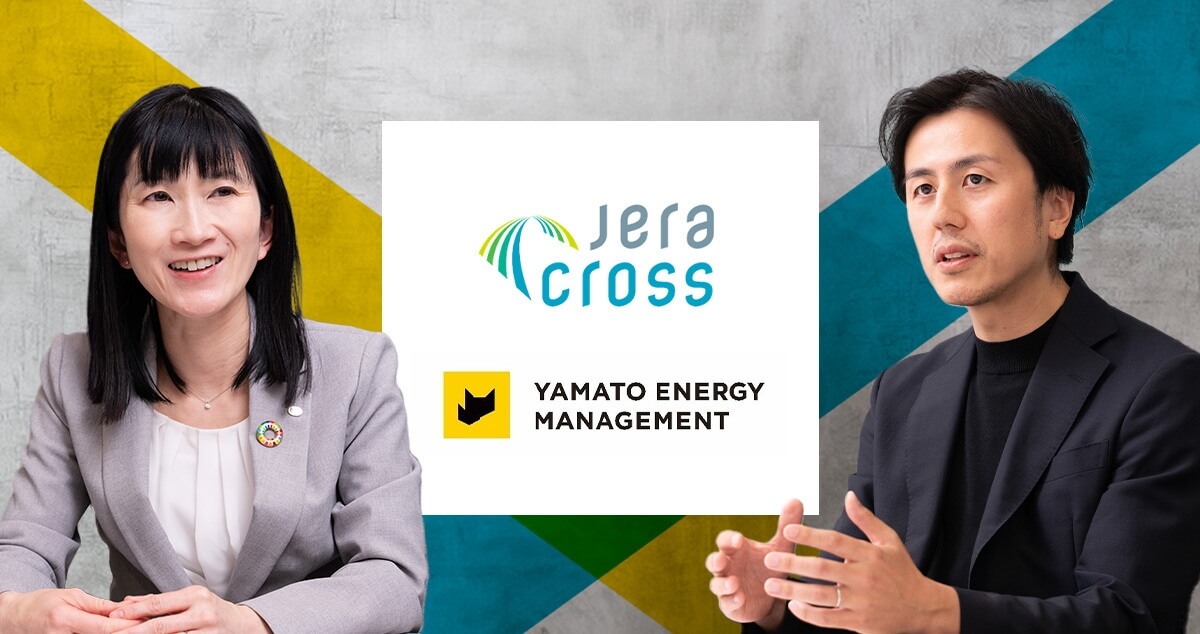
JERA Cross and Yamato Group Partner for “Lightning-Speed” Push Toward Decarbonization
22 July 2025
In certain industries, decarbonization remains a particularly formidable challenge. To help companies break through these barriers, JERA Cross was established in May 2024 as a driver of green transformation (GX), providing solutions to the challenges of corporate decarbonization.
Officially launched in June 2024 as a dedicated GX subsidiary of JERA Co. Inc., JERA Cross meets their clients’ needs by assembling agile teams of strategic consultants, energy experts, and digital professionals. As a “co-creation partner”, these teams assist their clients from concept to execution, helping them move beyond the idea of GX as a burden of corporate responsibility and transform it into value. JERA Cross’s greatest strength lies in leveraging JERA’s assets to providing tailor-made, one-stop GX solutions to suit each client’s unique situation and needs.
One year after its founding, JERA Cross is putting those strengths to work, driving GX efforts in the logistics industry through a partnership with the Yamato Group, Japan’s largest courier service provider. In January 2025, Yamato Holdings Co., Ltd. established a new company, Yamato Energy Management Co., Ltd. (hereinafter, “Yamato Energy”), to procure and supply renewable energy in partnership with the JERA Group.
JERA Cross provides full support for this initiative, managing power supply and demand operations and ultimately aiming to supply the Yamato Group with “24/7 carbon-free electricity”—electricity that generates zero CO2 emissions throughout the day and year, regardless of weather or other factors. If successful, this initiative could serve as a breakthrough not only for the Yamato Group but for the entire logistics industry.
We spoke with Kengo Ichikura, Director, Executive Officer and Chief Product Officer (CPO) of JERA Cross*1, and Saeko Morishita, Representative Director and President of Yamato Energy, for an inside look at this initiative by the two leading companies.
*1 At the time of this interview
Building an Energy Business Across 3,000 Locations Nationwide
Kengo Ichikura of JERA Cross recalls his early conversations with the Yamato Group, which includes Yamato Transport, the largest courier service provider in Japan with approximately 3,000 business locations nationwide.
“Our initial proposal was fairly conventional,” he recalls. “We proposed installing solar panels on the rooftops of Yamato Transport’s facilities and using Japan’s self-wheeling system to deliver that electricity to other locations.”
But the Yamato Group had something far more ambitious in mind.
One of the biggest hurdles to decarbonization is the reduction of greenhouse gas (GHG) emissions from vehicles. Even if the Yamato Group’s fleet were made fully electric, the use of non-renewable electricity to power those vehicles would still generate indirect GHG emissions. In today’s business world, where corporate measures to reduce Scope 3*2 emissions—those generated across the entire supply chain—viewed with increasing scrutiny, the Yamato Group’s role as a key logistics provider carries even greater responsibility. With this in mind, they were determined not only to reduce their own GHG emissions but to help drive decarbonization across the entire logistics sector.
*2 Scope 1 refers to a company’s direct emissions; Scope 2 covers indirect emissions from purchased electricity, heat, and steam; Scope 3 includes all other indirect emissions across the entire supply chain, excluding Scope 1 and 2.
To directly address this challenge, the Yamato Group outlined a plan to centrally manage their energy resources across Japan, including solar panels, batteries, and electric vehicles (EVs), and to leverage them in launching their own energy business.
“When I learned of the scope and significance of the Yamato Group’s vision—a leading logistics company looking to independently build their own energy business—I was deeply impressed by their ambition. But at the same time, I knew this would lead to significantly greater challenges in execution,” recalls Ichikura.
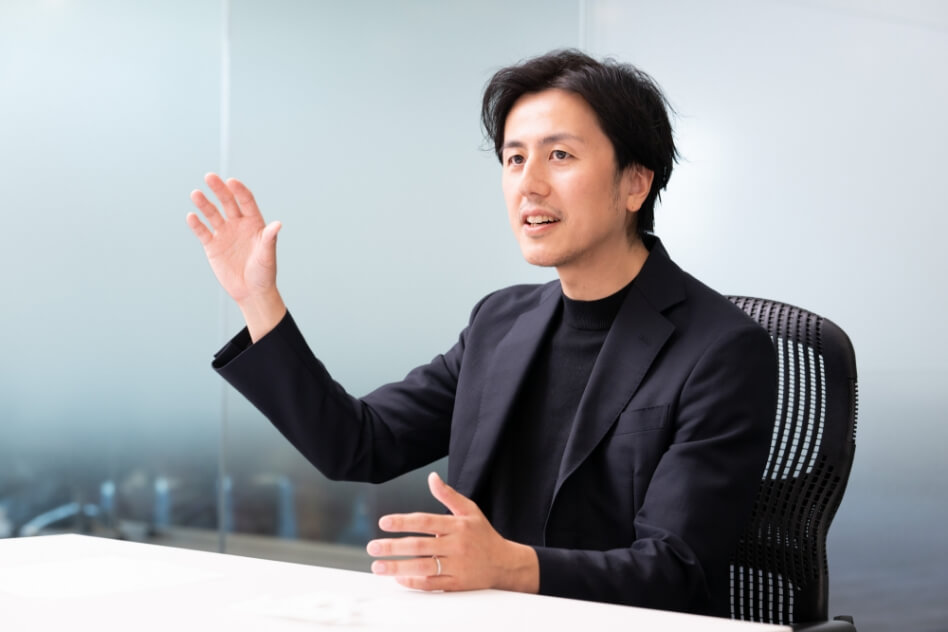
This marked the beginning of a new chapter, as the Yamato Group and the JERA Group joined forces to create a groundbreaking GX model to tackle the logistics sector’s green energy challenges.
The Yamato Group has set an ambitious target: achieving net-zero GHG emissions from its operations by FY2050, with a 48% reduction from 2020 levels by FY2030. Achieving this goal requires not only introducing EVs and installing solar panels and other equipment, but also:
(1) building a diverse power portfolio to ensure a stable renewable energy supply around the clock and
(2) establishing an advanced energy management system that integrates consumption data from about 3,000 locations nationwide at 30-minute intervals—a fundamental overhaul.
Previously, each business location was responsible for its own contracts and operations related to the introduction of solar power systems and the procurement of renewable energy. This new initiative will require nationwide optimization and continuous, around-the-clock supply and demand balancing, which would have been impossible without a company-wide management system.
Yamato Group Commits to Entering the Electricity Business
In response to the Yamato Group’s ambitious vision, JERA Cross expressed its intent to act as a “co-creation partner,” working side by side with the Yamato Group toward a shared goal in a relationship that goes beyond that of a client and a service provider. At JERA Cross, a team of in-house consultants and energy experts was assembled to turn the Yamato Group’s vision into a practical, detailed model. The Yamato Group continually put forward new proposals, and JERA Cross responded by quantitatively and qualitatively analyzing the issues and possible solutions and sharing their analysis with the Yamato Group. Through a cycle of feedback and fine-tuning, the plan steadily took shape and gained strength.
“In the initial phase, JERA Cross will provide full support for the supply and demand management of renewable energy, batteries, and EVs across roughly 3,000 sites nationwide,” explains Ichikura. “Once that system is up and running, operations will gradually shift to Yamato Energy, which will eventually function as a retail electricity provider capable of procuring power directly from power plants. The roadmap we have agreed on will significantly expand the Yamato Group’s decarbonization options.”
By establishing its own retail electricity company, the Yamato Group will become authorized to procure electricity directly from power plants and take control of both the Group’s renewable energy mix and energy costs— a strategic decision to broaden their decarbonization options and strengthen execution capabilities.
They also saw an opportunity to make better use of locally generated renewable energy. “For many years, the Yamato Group has operated logistics businesses that are deeply integrated into local communities, including our ‘TA-Q-BIN’ services, which has business locations across Japan,” says Yamato Energy’s Saeko Morishita. “By launching a retail electricity business, we can both use locally generated renewable energy in the region where is generated and supply it to local transport companies and EV operators. We believe this can further drive decarbonization across the entire logistics sector, while staying true to our fundamental policy of integration with local communities.”
This decision to take a bold step into the energy sector was driven by the Yamato Group’s commitment to accelerating decarbonization in the logistics industry.
From Vision to Reality in One Year: Yamato’s First Step into Energy
The process moved quickly. Just about a year after beginning discussions with the JERA Group, the Yamato Group established Yamato Energy in January 2025. (As of April 2025, their application for registration as a retail electricity provider is still under review.) “This would not have been possible without JERA Cross’s full support,” says Morishita.
The speed of the collaboration was fueled by JERA Cross’s ability to break down the Yamato Group’s ambitious vision into concrete actions, and by the early establishment of their relationship as “co-creation partners” fully aligned toward a shared goal. Another key factor was the reassurance that joining JERA Cross’s balancing group*3 would allow for more efficient and stable supply and demand management than the Yamato Group could have accomplished on their own.
“I believe JERA Cross was able to make a significant impact by helping the Yamato Group develop their ambitious vision into concrete steps,” reflects Ichikura.
*3 A system in which multiple companies collaborate to balance supply and demand in real time

Contracts for 3,000 Locations Switched Over in Just Three Months
One example demonstrates the remarkable scale and speed of this partnership.
Just three months after Yamato Energy was established, a decision was made to entrust the new company with the electricity management for approximately 3,000 sites across Japan. Looking back on this decision, Morishita says, “Because we have locations in every corner of Japan, we wouldn’t have been able to start operations at all of them just three months after the company was founded without the robust support of the JERA Group and the cooperation of everyone involved.”
“The teams on the ground were scrambling to meet tight deadlines,” recalls Ichikura, “but once we had made up our minds to succeed, we were able to push through to the finish line.” This marked the real starting point for the Yamato Group’s full-scale use of renewable energy.
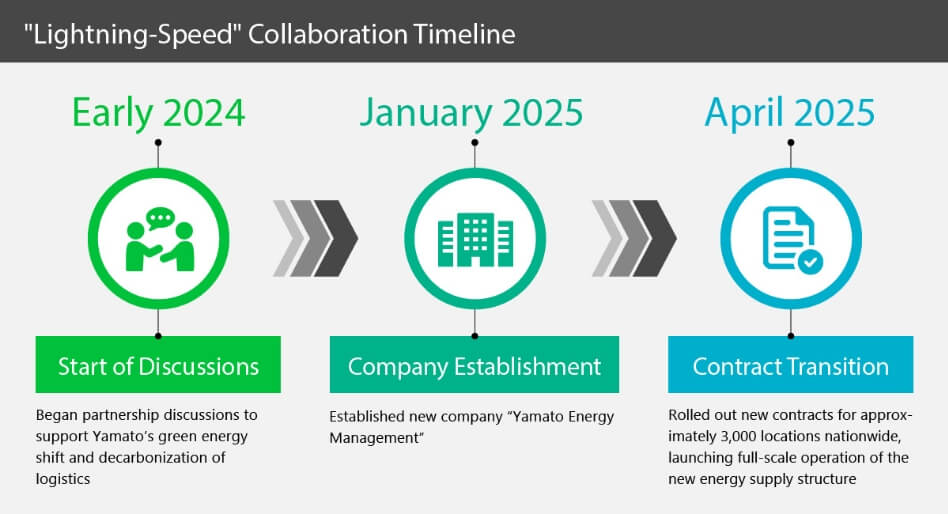
“Our success in completing the switch at what I’d call ‘lightning speed’ has given JERA Cross great confidence,” Ichikura continues. “If we can achieve this in the famously difficult logistics sector, I believe we can apply these solutions in other industries as well.”
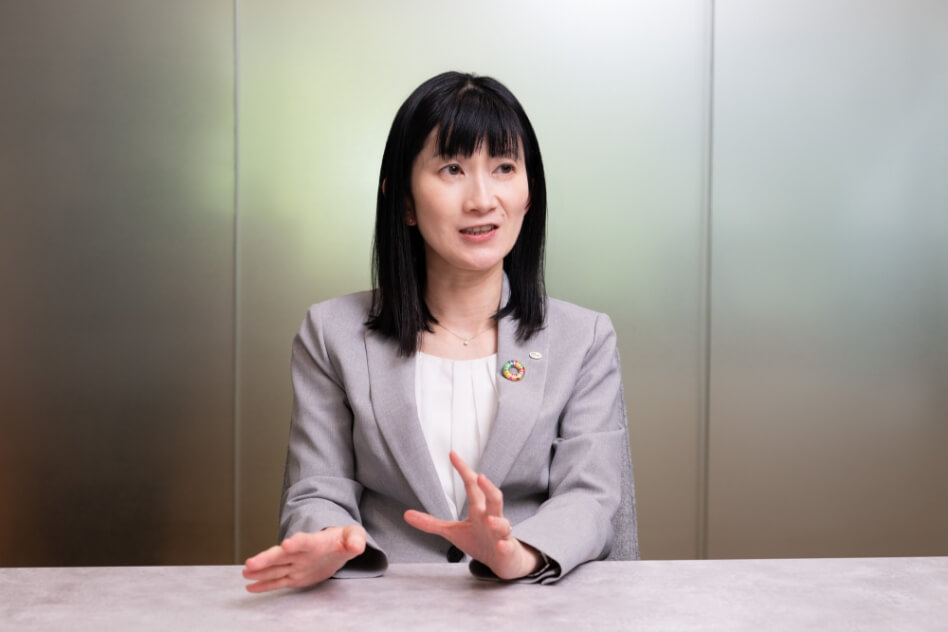
Driving GX through Consulting, Operations, and Digital Technologies
JERA Cross provides the Yamato Group with three core capabilities: consulting, energy operations, and digital technologies. “At JERA Cross, we adjust our focus for each phase of the project, delivering solutions tailored to its evolving needs,” explains Ichikura.
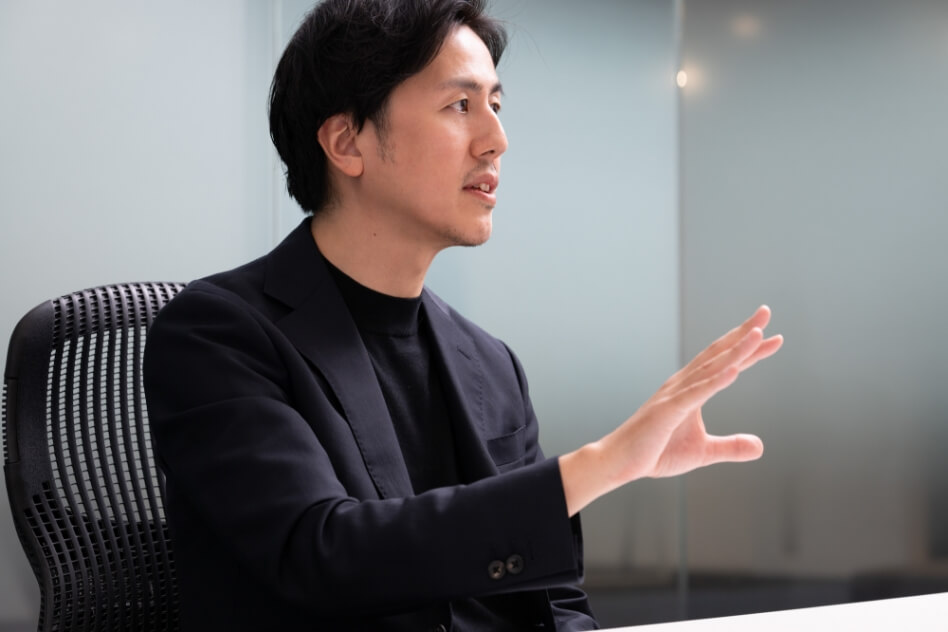
Going forward, the collaborative GX project will be carried out across three phases.
JERA Cross will initially take the lead in supply and demand management operations, ensuring stable operations until tangible results have been achieved. Once the operational model has been sufficiently established, it will be handed off to Yamato Energy, which will gradually assume responsibility for the ongoing operations. Ultimately, Yamato Energy aims to develop renewable energy in house, procure clean power as a retail electricity provider, and supply that power to both the Yamato Group and external companies. JERA Cross, as an ongoing business partner, will also continue to provide support as needed.
Bringing the TA-Q-BIN Philosophy to the Energy Business
“By supplying locally generated renewable energy to the Yamato Group’s facilities, delivery vehicles, and local transport companies,” explains Morishita, “we hope to revitalize both the logistics industry and local communities. For years, Yamato Transport and our TA-Q-BIN service have been a part of local communities. We want to bring that same philosophy to the energy business.”
Although decarbonization remains a major challenge in the logistics industry, the Yamato Group is stepping up to lead the way.
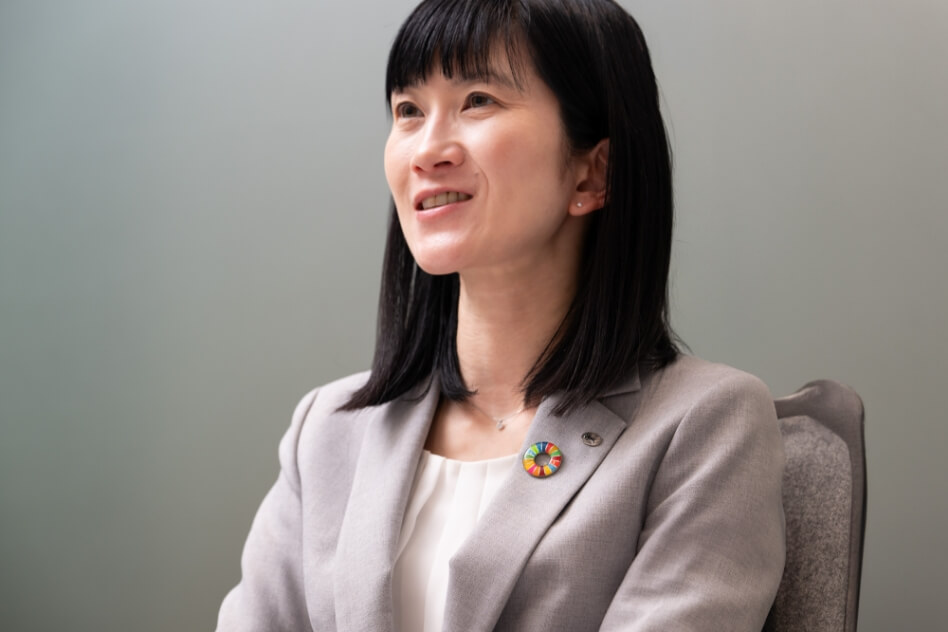
JERA Cross’s Vision for the Future
Since announcing their collaboration with the Yamato Group, JERA Cross has received a surge of inquiries, opening dialogues with a wide variety of companies.
The JERA Group’s strength lies in their ability to deliver one-stop support, from renewable energy procurement and supply and demand management to business strategy and concept development for the decarbonization era. “GX isn’t a cost burden—it’s a value driver that enhances corporate value,” stresses Ichikura. “What we’ve done with the Yamato Group can serve as a model that can be rolled out across many other industries.”
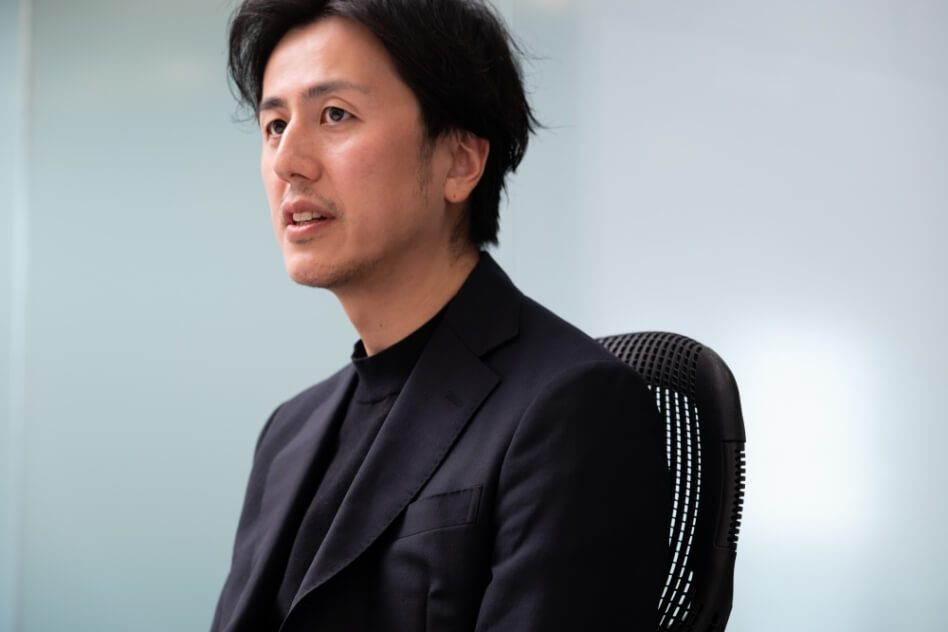
On his vision for transformation, Ichikura says, “Some might say this project succeeded only because it was with the Yamato Group. That may have some truth to it, but challenges like this don’t have to start big. You start small, learn from each attempt, and build on what you’ve learned for the next time. Repeating this process is what ultimately leads to full-scale transformation.
“I hope this inspires other companies to realize that there are first steps they can take, too. We want to keep working on how we communicate and support our business partners so they can also feel empowered to take their own first step.
“JERA Cross is uniquely positioned to provide seamless, end-to-end support from strategy to execution in a way that no other energy company can. Whether a company has a vision but doesn’t know how to achieve it, or hasn’t yet taken even that initial step—JERA Cross is committed to partnering with each of our clients, walking alongside them toward a shared vision.
“If we keep pressing forward, step by step, breakthroughs will follow. In this way, we can achieve GX here in Japan. I truly believe that.”
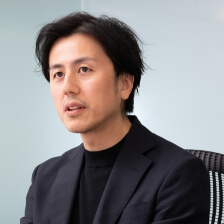
Kengo Ichikura
Director and Executive Officer & CPO (Chief Product Officer)*4, JERA Cross Inc.
*4 At the time of this interview
Kengo Ichikura joined TEPCO in 2006, working on both domestic and international thermal power generation projects. He joined JERA in 2018, first leading digital strategy and digital transformation (DX) initiatives and later serving as general manager of the Digital Transformation Section, overseeing digital power plant projects and digital platform strategies. In 2023, he assumed the role of senior supervisor in the Solutions Service Division, focusing on new business development. He was appointed Director and Executive Officer & CPO (Chief Product Officer) of JERA Cross Inc. in June 2024.

Saeko Morishita
Representative Director and President, Yamato Energy Management Co., Ltd.
Saeko Morishita joined Yamato Transport in 2007. After gaining frontline experience at branch offices, she moved to Yamato Holdings’ Finance & Corporate Strategy Division, where she handled company-wide finance, management, and environmental initiatives. In February 2024, she joined Yamato Transport’s Green Innovation Development Department, where she played a central role in the team that established Yamato Energy. In 2025, she was appointed Representative Director and President of Yamato Energy, where she leads by leveraging both her on-the-ground logistics experience and financial and management expertise.
RELATED STORIES
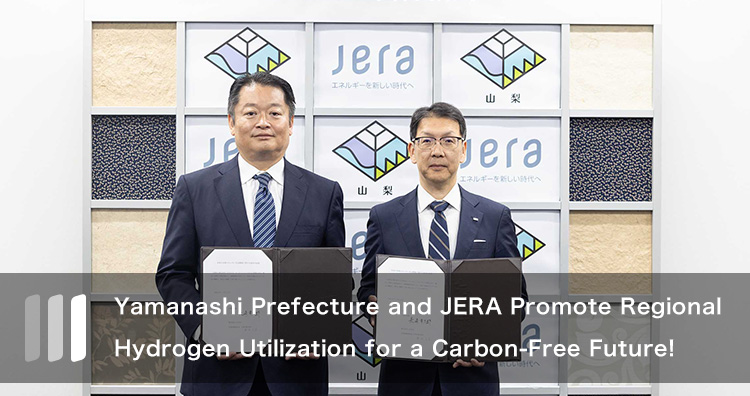
Yamanashi Prefecture and JERA Promote Regional Hydrogen Utilization for a Carbon-Free Future!
Amidst global changes in the energy landscape, hydrogen has garnered attention as a clean energy source,…

JERA Cross Launched to Accelerate Corporate Green Transformation (GX)


